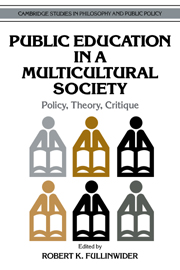Book contents
- Frontmatter
- Contents
- Contributors
- Preface
- PART I INTRODUCTION AND CRITIQUE
- PART II CULTURE AND IDENTITY
- PART III RELATIVISM, REASON, AND PUBLIC EDUCATION
- 6 Locke and multiculturalism: toleration, relativism, and reason
- 7 Challenges of multiculturalism in democratic education
- PART IV TEACHING HISTORY
- PART V TEACHING LITERATURE
- Index
7 - Challenges of multiculturalism in democratic education
Published online by Cambridge University Press: 05 June 2012
- Frontmatter
- Contents
- Contributors
- Preface
- PART I INTRODUCTION AND CRITIQUE
- PART II CULTURE AND IDENTITY
- PART III RELATIVISM, REASON, AND PUBLIC EDUCATION
- 6 Locke and multiculturalism: toleration, relativism, and reason
- 7 Challenges of multiculturalism in democratic education
- PART IV TEACHING HISTORY
- PART V TEACHING LITERATURE
- Index
Summary
How can a multicultural society educate its members for democracy? Many contemporary controversies about public schooling turn on the clash of two apparently competing educational aims: securing common values and respecting cultural differences. This chapter argues that democratic education can integrate both civic and multicultural aims, and not merely in a pragmatic compromise but in a genuinely principled combination. At the outset, I describe two responses that fail to do justice to both aims. One response sets the project of civic unity against the diversifying tendencies of multiculturalism; the second puts cultural diversity above the claims of civic education. Both responses reflect significant political impulses in the United States and throughout the world, and both contain partial insights. I try to capture the partial truth in each and integrate them into a democratic conception of civic and multicultural education.
The second part of the chapter develops the integration by considering a test case – a recent French controversy known as the “Affair of the Scarf” or the “chador case” – that highlights one of the deepest conflicts endemic to multicultural societies. Can a conception of democratic education at least provisionally resolve conflicts between religious toleration and the other civic aims of democratic education? I show how a democratic response to this case can respect a wide range of cultural differences without sacrificing the aims of teaching a common set of civic values to all citizens.
- Type
- Chapter
- Information
- Public Education in a Multicultural SocietyPolicy, Theory, Critique, pp. 156 - 180Publisher: Cambridge University PressPrint publication year: 1996
- 26
- Cited by

